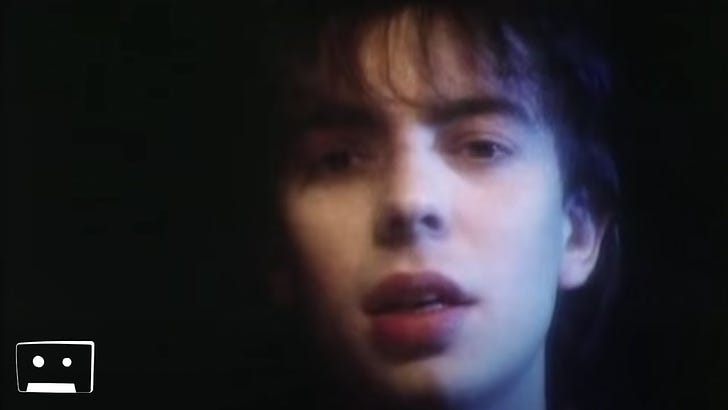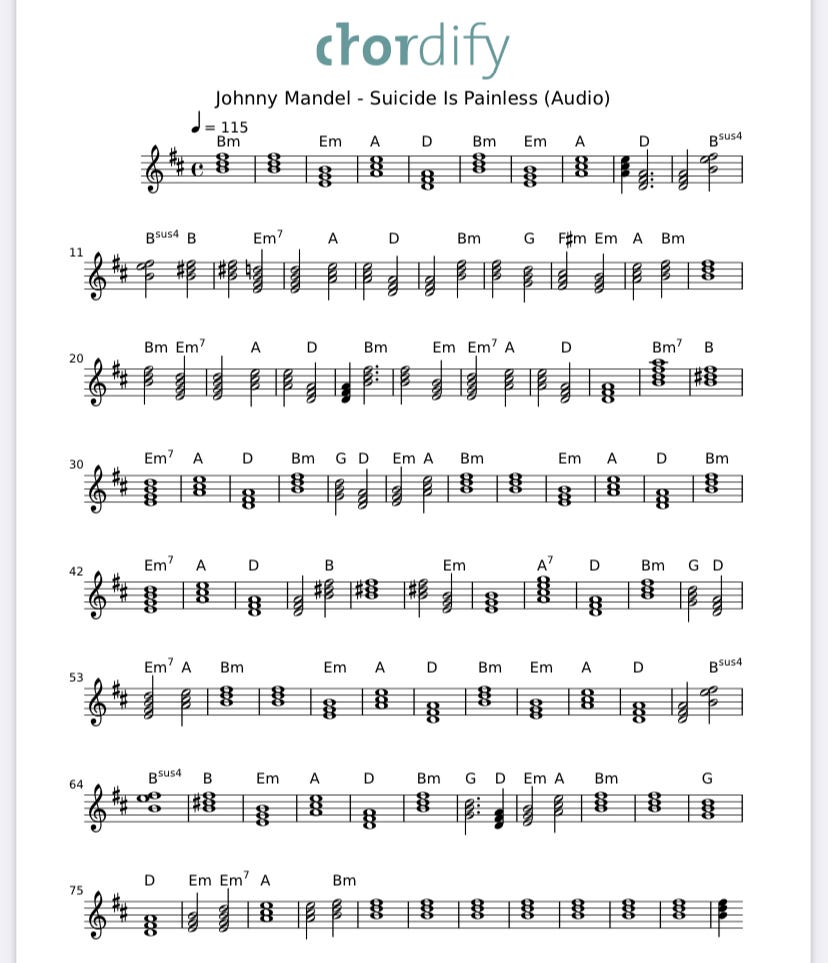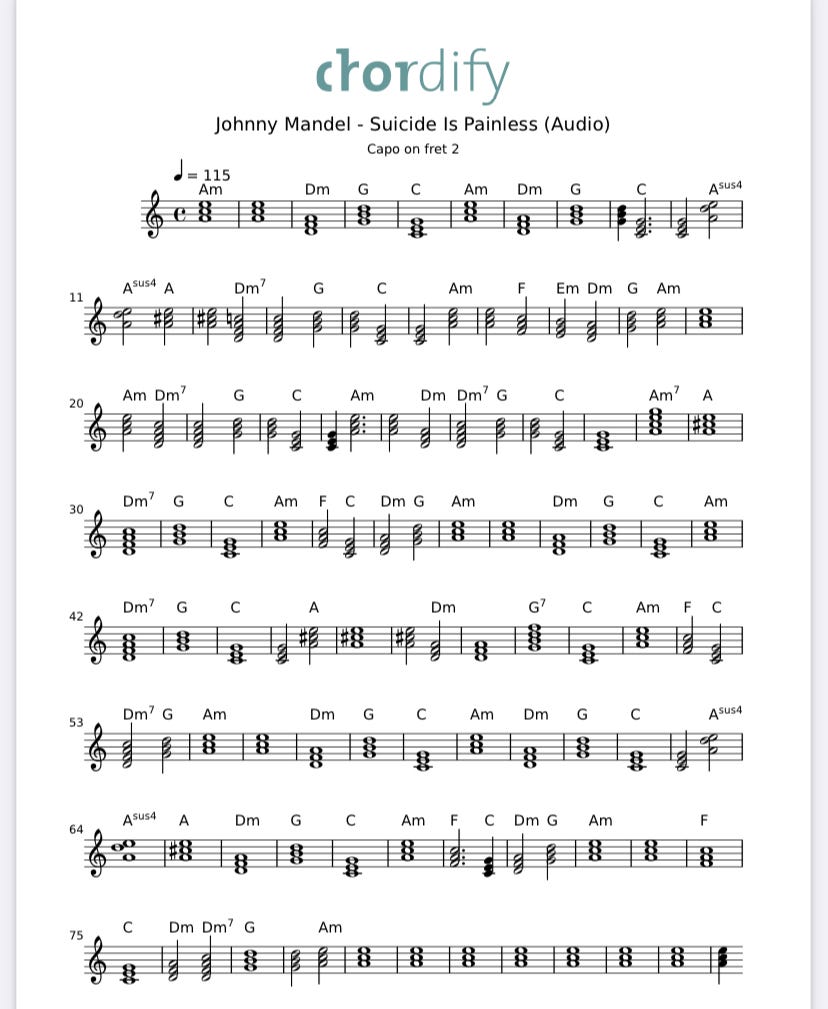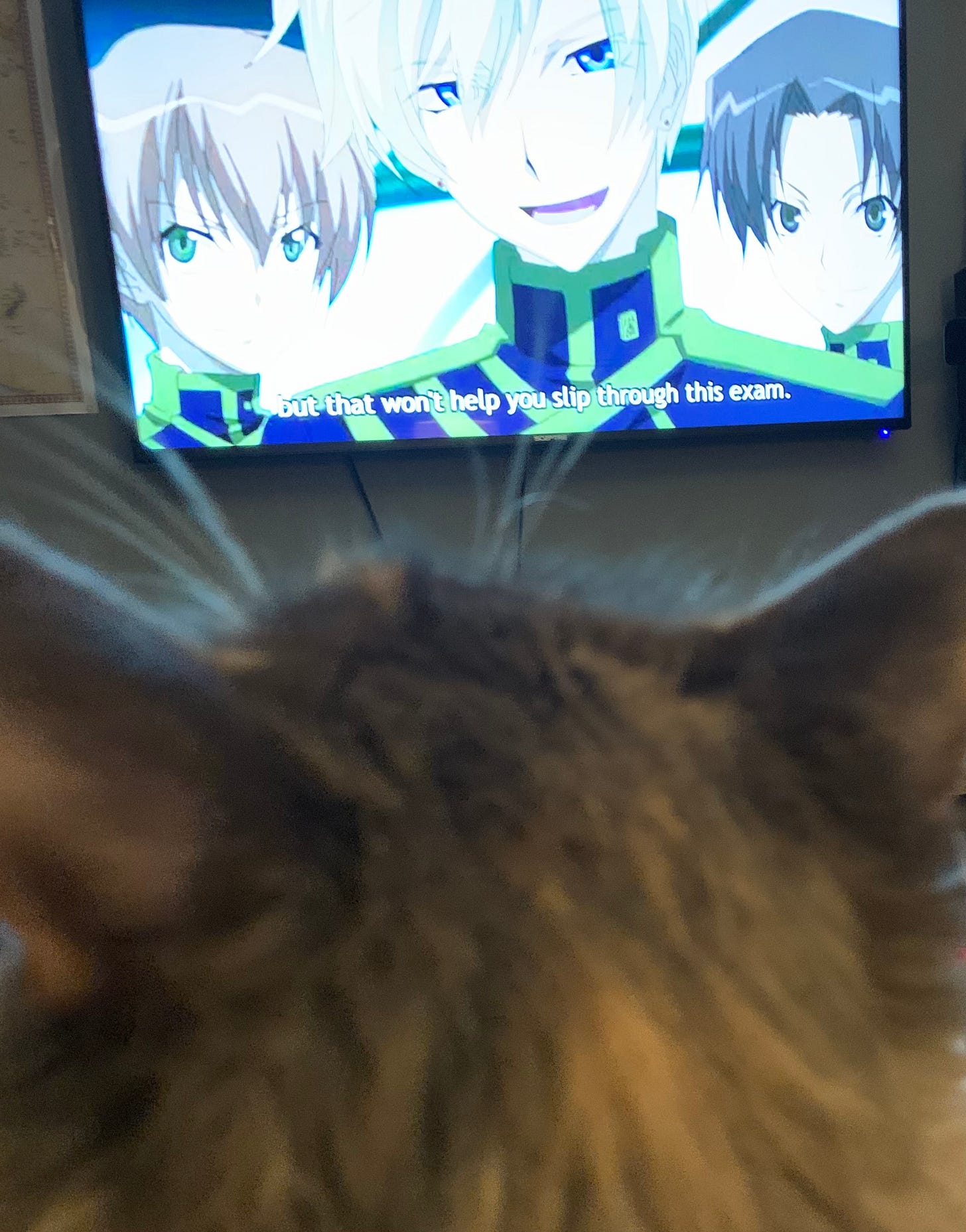Last week’s rando lyrics: The lyric, “Fate Up against your will Through the thick and thin" is from the song “The Killing Moon” by Echo & the Bunnymen. It is Track 6 on the 1984 album, “Ocean Rain.“. “Often regarded as Echo and the Bunnymen’s greatest song, this 1984 single hit #9 on the UK charts. The song was also featured in the 2001 film Donnie Darko.” Credit: Genius Link: The Killing Moon
(Ed. It’s October, and whatever that may mean to anyone one else, it definitely means “Donnie Darko” will be on at my house. This might not be the last rando lyrics from the soundtrack…. Just sayin’…)
A Look Ahead
The poll results are…about what I expected, but I wanted to give readers an opportunity. So, pretty much a tie between all options, some helpful comments, but for now at least I’m going with one post a week on Fridays. whatever subjects we’ve covered on either day in the past will be the main feature, along with varied links that pop up during the week, and Mika, the Cat every week we have new subscribers (we’ve been on a roll and haven’t had a week without at least one new subscriber lately - Thank you all so much!!).
I’m going to try for a “theme” each week, kind of like last week’s posts where we tied the concept on Thursday of “The Big Idea” in songwriting to a concept in the Lifehouse song “Broken” on Friday, where the lyrical meaning was not clear from just hearing or reading the lyrics. Only later did we learn the song meaning was related to a friend’s medical condition, until then the words were non-specific in detail, yet still universal enough that they could evoke a wide range of feelings or emotions in listeners.
As music related events occur (I’m leaving current events around the world to the purported experts and staying focused on music related events here) I may do more “Special Editions) - thanks for sticking with me!
Welcome to this week’s post!
Let’s start with an interesting post by fellow Substack writer Chris Dalla Riva.
Other Voices
Definitely worth the read - one very interesting aspect is the recent and somewhat ubiquitous “Skip Intro” button on many of the video streaming services (Amazon, Netflix for example), which may be contributing to the demise, or at least obsolescence, of the television “theme song”.
I get it, binge watching on streaming services is easy now, certainly easier than the days of broadcast network sitcoms and dramas, and if you’ve seen the opening credits and heard the theme music once or twice already it’s pretty easy to decide to just get on to the actual programming.
So that brought me to considering whether many, or any, movie theme songs ever made it to television. “Yes” is the answer, and more than a few. For example, the “Pink Panther Theme” is iconic:
“The Pink Panther Theme" is a jazz composition by Henry Mancini written as the theme for the 1963 film The Pink Panther and subsequently nominated for the Academy Award for Best Original Score at the 37th Academy Awards but lost to the Sherman Brothers for Mary Poppins. The eponymous cartoon character created for the film's opening credits by David DePatie and Friz Freleng was animated in time to the tune. The tenor saxophone solo was played by Plas Johnson.” Credit: Wikipedia Link: The Pink Panther Theme"
Possibly the most famous movie theme to make it to television is the song “Suicide Is Painless”, which many folks might think of as just the television series’ “Theme From M*A*S*H”. The television series opening credits used the instrumental version of the song, but the lyrics were never used - probably due to their seriously downbeat nature as well as the implications of its context in the movie, I imagine. Though, if you ever played in a high school band, you may be forgiven for thinking the most famous was the theme to “Peter Gunn”. Peter Gunn was a television show only though, and while iconic, was not a movie theme song.
“Suicide Is Painless” is the opening theme from the film “M*A*S*H”, and the lyrics to the song are sung in the opening while scenes of helicopters transporting wounded soldiers play under the credits. The lyrics were also heard as part of a plot sequence where they were sung during the preparations for the self imposed demise of the unit’s dentist, because reasons, which ultimately didn’t occur in a sort of “happy ending” manner… So.
Despite all that, the opening riff is certainly one the most recognizable in television history, discounting perhaps the “Lone Ranger” series use of the 1812 Overture as the theme music. For sure, popular series themes such as WKRP IN Cincinnati, The Mary Tyler Moore Show and The A Team are easily recognized by the opening measures of their themes, as are many others, but the popularity of M*A*S*H the film, and the longevity of the series probably puts it in a class of its own. Before I go on, I’ll include a link to Rolling Stone’s list, which differs from my assessment (but of course theirs is wrong)….. Link: Rolling Stone List (Interesting but Incorrect), and don’t even get me started on “Best Movie Theme” playlists from Apple or Spotify…
So, of course, “Suicide Is Painless” is today’s:
A Song To Play
“"Suicide Is Painless" (or "Song from M*A*S*H") is a song written by Johnny Mandel (music) and Michael Altman (lyrics) (Ed. Never heard of him? Check out the next paragraph - hilarious!) for the 1970 film M*A*S*H. In addition to being performed by characters in the film, it plays during the title sequence as sung by The Ron Hicklin Singers. An instrumental version is likewise the theme music for the TV series based on the film, playing over the opening and closing credits. Background The song was written for Ken Prymus, the actor playing Private Seidman, to sing during the faux-suicide of Walter "Painless Pole" Waldowski (John Schuck) in the film's "Last Supper" scene.[1] Director Robert Altman had two stipulations about the song for composer Johnny Mandel: it had to be called "Suicide Is Painless" and it had to be the "stupidest song ever written".[2] Altman attempted to write the lyric himself, but, upon finding it too difficult for his "45-year-old brain" to write something "stupid" enough,[3] he gave the task to his 15-year-old-son Michael, who reportedly wrote the lyrics in five minutes.[4][5] Altman later decided that the song worked so well he would use it as the film's main theme. This more choral version was sung by uncredited session singers John Bahler, Tom Bahler, Ron Hicklin, and Ian Freebairn-Smith, and was released as a single attributed to "The Mash". Altman said that, while he only made $70,000 for directing the movie, his son had earned more than $1 million for co-writing the song.[6] Several instrumental versions of the song were used as the theme for the TV series, but the lyrics were never used in the show.[7] It became a number-one hit in the UK Singles Chart in May 1980.[8] The song was ranked No. 66 on AFI's 100 Years...100 Songs." Credit: Wikipedia Suicide Is Painless
From Genius:
“The Tongue-in-cheek theme song for the very sad tongue-in-cheek comedy about the Korean war – directed at the Vietnam war – for both film and TV series. The film was released in 1970, at the height of the Vietnam war, and the TV series debuted in 1972, appealing to the growing anti-war crowd, lasted 11 years and was arguably one of the most successful series ever.”
[Verse 1]
Through early morning fog I see
Visions of the things to be
The pains that are withheld for me
I realize and I can see
[Chorus]
That suicide is painless
It brings on many changes
And I can take or leave it if I please
[Verse 2]
The game of life is hard to play
I'm gonna lose it anyway
The losing card I'll someday lay
So this is all I have to say
[Chorus]
Suicide is painless
It brings on many changes
And I can take or leave it if I please
[Verse 3]
The sword of time will pierce our skin
It doesn't hurt when it begins
But as it works its way on in
The pain grows stronger, watch it grin
[Chorus]
Suicide is painless
It brings on many changes
And I can take or leave it if I please
[Verse 4]
A brave man once requested me
To answer questions that are key
"Is it to be or not to be?"
And I replied, "Oh, why ask me?"
[Chorus]
Suicide is painless
It brings on many changes
And I can take or leave it if I please
And you can do the same thing if you please
So a couple of ways to play, first no capo, original chords. Pretty sure this is the Key of Bminor, the relative minor key of DMajor. More on that in a bit. 4/4 common time, a faster than I would expect tempo of 115 BPM. Some moderately challenging barre chords for beginners and intermediate players, but worth the effort I think.
That goes along with the probable choice of the minor key - as the title and lyrics (sarcastically) suggest, this is not a happy little jingle. Rather a serious subject in a decidedly antiwar film, though the plot of the film conveys this via a lot of reductio ad absurdum scenes that more or less hang together as a plot. The movie isn’t meant to be serious in itself, it’s meant to convey a sense of the absurd in war as a comment on the absurdity of war. Your interpretation mileage may vary, of course. The choice of an accessible minor key, Bminor, is a good one to accentuate the downbeat theme of the lyrics, while catching the ear of the listener - and that’s probably why the tempo is a bit quicker (and catchier) than one would expect in song that doesn’t seem to want to take itself more seriously.
Technique wise, the arpeggiated intro is perfect for fingericking or flatpicking, and as the lyrics come in it can be strummed or stick with the finger/flat pick (definitely my choice - this is almost a campfire song to begin with - it gets a little overwhelmed by the choral accompaniment and later in the song some orchestral background to it - it was the 70s after all…). A single acoustic guitar with little else seems to fit it best, IMHO, though a couple of guitars won’t hurt, and some harmonizing voices can capture the original vibe.
If the barre chords aren’t for you, capo on 2 and play the chord shapes of the Key of Aminor, the relative minor key of CMajor. Or just leave the capo off if Aminor is a better fit for your vocals.
Some Links for today:
List Of Televison Programs Based On Movies - amazing, I had no idea! MASH is listed as an adaptation.
The Pink Panther Theme - Wikipedia
Playing With A Slide - Interesting article from Carvin Audio
Songwriting Skills - from Songtown, always good stuff
Chord Shapes All Around The Neck
A couple from the Disc Makers Blog:
This Substack is free, I receive no compensation of any kind from companies or products I mention. Some linked or quoted material may be copyrighted by others, and I credit them. I rely on the “Fair Use” doctrine for educational purposes (Link: Fair Use). I do not use AI, things I link to might though. -Michael Acoustic
Thank you, new Subscribers!!!!!! Mika, the Cat, welcomes you!!
This Week’s Conversation With Mika:
Me: “Watching anime curled up on my lap when you’re feeling a bit sore from vaccinations is nice, isn’t it?”
Mika: “Will you please shut up!? I’m trying to follow the plot in Japanese while reading the subtitles in English!”
Me: “Umm, right….”
Shameless Self Promotion Section:
My song is out! Link: “Long Road Back” (click on link for streaming options)
What I’m Listening2: While Western television may be eschewing theme songs because of the “Skip Intro” button, Japanese anime definitely isn’t. Today’s WIL2 is a mix of Western and Japanese anime film/television themes. If you’re not a Japanese anime fan (yet), you may be surprised at just how good the music can be….
Cheers and keep playing!!
Michael Acoustic
“It’s never really final - you just run out of things you can bear to change…”










I remember "Suicide is "Painless" very well. A cynical and sarcastic ode to one of many forgettable wars (Korean War).
I've always liked dark humor. Irony is a bulwark tool of satire. The best, to my mind, is Eric Idle's "Always Look on the Bright Side of Life" at the end of Monty Python's "Life of Brian." Still funny as hell 46 years later.
Perfect!! So much cool in that!!! Still so many enigmas even after the explanations! I always see something I’d forgotten or discounted each time! Great comment, Nic!